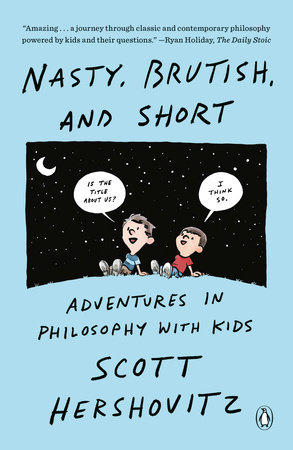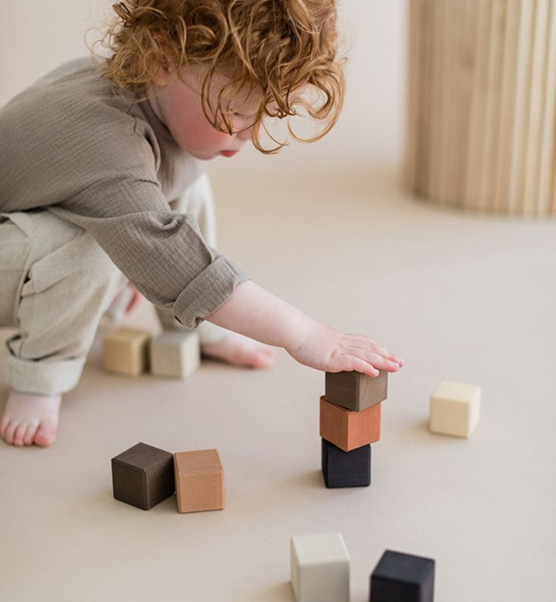Today I am featuring an interview with Scott Hershovitz about his new book, Nasty, Brutish, and Short, which is out tomorrow. This book is a philosophy class, through the lens of parenting. I love it. This conversation was had over email. We weren’t able to record audio for this one, but we will restart the feature later this week.
I run the law and ethics program at the University of Michigan, where I’m also a professor of law and philosophy. In my day job, I’m interested in philosophical questions about law: Are people obligated to obey the law? What is punishment, and when (if ever) is it justified? How should we respond to wrongdoing? What’s authority, who has it, and why?
I’ve got two boys: Rex and Hank. And shortly after Rex (the older one) arrived, I realized that I was talking about him a lot in class. If I was giving a lecture about punishment, I’d start with a story about something Rex did and ask my students how we should respond. My class would come alive. People love to talk about kids and the crazy things they do. And it would get a conversation about the purposes of punishment going.
My book grew out of those experiences. It’s an irreverent introduction to philosophy. I want to bring the fun conversations from my class to a broader audience. But the book’s also a plea to take kids seriously as thinkers. Because it turns out kids are really good at philosophy. I didn’t anticipate that before I had kids. But from the time they could talk, Rex and Hank asked philosophical questions and tried to answer them. And they advanced sophisticated arguments. In fact, they re-created lots of famous arguments from the history of philosophy, all on their own. And it turns out that’s not unusual. Lots of little kids do it. So the book encourages parents to see their kids as the sophisticated thinkers they actually are — and to join them in their philosophical adventures.
You probably realize this, but I feel like your book is more than a little bit of an intro philosophy class. I learned a lot! For the people here who haven’t (yet) read it, do you want to give a flavor of one lesson? Pick your favorite…
Once Zhuang Zhou dreamed he was a butterfly, a butterfly flitting and fluttering around, happy with himself and doing as he pleased. He didn’t know he was Zhuang Zhou. Suddenly, he woke up, and there he was, solid and unmistakable Zhuang Zhou. But he didn’t know if he were Zhuang Zhou who had dreamed he was a butterfly or a butterfly who was dreaming he was Zhuang Zhou.
It’s harder than you think to prove that, at any given moment, you aren’t dreaming. And as Descartes realized, that calls into question everything you think you know — you might have dreamed it — or perhaps you’re just dreaming now. Once Rex raised the worry, we started playing a game. He would try to think of a way to prove he wasn’t dreaming. I would knock it down. Or sometimes I’d ask him to knock it down himself, which he got pretty good at. That went on for years, until one day, in second grade, he finally reached peace about the possibility he was dreaming his entire life. He came to realize that if he was dreaming, he didn’t want the dream to end. (I won’t share what drove him to that conclusion, as it would spoil the sweetest story in the book.) But I thought it was super-cool that Rex not only re-created dream skepticism, he found a way to put it in perspective — and in doing so, recapitulated hundreds of years of philosophical thought about the limits of our knowledge and the significance of those limits for our lives.
One more example, just so people don’t get the impression that my kids are special. In the book, I tell the story of a boy named Ian. One night, another family came over to visit, and that family’s three kids monopolized the television, keeping Ian from seeing his favorite show. After they left, Ian asked his mother, “Why is it better for three people to be selfish for one?”
I love that question. It’s so simple — and subversive. Indeed, it poses a deep challenge to the way many economists think about the world. They argue that we should maximize the satisfaction of people’s preferences. But Ian invites us to ask: Should we care about preferences if they’re simply selfish? Maybe. But Ian shows us that we need an argument for a conclusion that lots of grown-ups take for granted.
(Actual economist solution: individual iPads. But I digress.)
This raises to me one of the most vexing problems of parenting, which is fairness. The other day my kids both wanted the last piece of bacon, and I literally took out the kitchen scale so I could weigh it when I cut it in half. Obviously that wasn’t sufficient, because they both wanted the same tiny corner.
I frequently tell them, “Fair isn’t always equal,” usually when one person gets less TV because of some activity they have to do. But I do sometimes wonder whether this means anything. Why isn’t fairness equal? Please give me some philosophy for this, so I do not have to weigh out the bacon.
But you don’t have to weigh bacon to treat people fairly! When we have something to divide here, we sometimes follow the I cut, you choose method. One kid would cut the bacon and the other kid would then choose the piece he wanted. This gives the kid who cuts a strong incentive to make sure that each piece is equally desirable. (I cut, you choose shares a lot in common with John Rawls’s idea that a just society operates by the rules people would choose if they didn’t know who they were. If you didn’t know your race, gender, or socioeconomic status, you’d want a society that worked for everyone.)
But there are other bacon options! I would have been tempted to say, “There isn’t enough for everyone, so we’ll put this away and use it later.” If your kids are little, there’s a good chance they’d just forget about it — and you could snack on it later. But with many years of parenting under my belt, I’d attempt to avoid the controversy entirely by announcing at the outset of the meal just how much bacon each kid would get.
Fairness is a squirrelly word, and kids way overuse it. But I think your instinct — that equal treatment does not mean identical treatment on every occasion — is correct. The challenge when you have more than one kid is making sure that they feel equally loved — and know that their status in the family is the same. That’s hard when you are splitting a single piece of bacon. But even just a promise that, next time, the kid who loses out now will get the better bit of bacon can go a long way.
As a book of parenting advice (which I think of it as, at least in part), what strikes me is that you talk largely about the big, hard, confusing conversations. The ones that most of us basically try to ignore. Like Is God real?, Do we matter?, and Am I dreaming my whole life? And when you do this — or at least, when you write about it — much of what comes across is you asking questions. So is that the right way to do this? Presumably you teach your students with the Socratic method. Same for kids?
But even on smaller issues, I question my kids a lot. In our house, you’re not “entitled to your opinion,” as Americans like to say. You have to defend them. I ask the boys questions, then I question their answers, so they have to think critically about their own ideas. I want to get them in the habit of backing up their opinions with evidence and arguments. But more than that, I want them to know that you shouldn’t have an opinion unless you can back it up — and if the evidence and arguments aren’t on your side, you should change your mind.
You must be super-frustrated with the people who feel in their bones that COVID isn’t real, or that ivermectin cures it, all evidence aside. And you’re doing this huge public service by helping parents find the relevant evidence and think through its significance. I want my kids to have that orientation toward the world. And questioning them — and making them make arguments — is a key part of that. The only downside is that they’ll do it back to you. (But of course, that’s upside too — just exhausting sometimes.)
I want to ask you about writing about your kids, which we both do. How do they feel about it? Did you ask their permission to have them in the book? Did they read it? (I realize I don’t know how old your children are, so maybe the last question is not relevant!)
When I first had the idea for the book, the boys were enthusiastic about it. They were excited to see themselves in print and squabbling over who would be featured in more stories. They’re still into it, but maybe a bit more reluctant. Hank, in particular, is keen for me to tell everyone that he’s older now than he is in many of the stories. I suspect their attitudes toward the book will shift over time. I wouldn’t be surprised if, in adolescence, they’re upset that I spoke about them in public at all. But I hope that they’ll eventually come to see the book the way I do — as something like a love letter to the two of them. They bring me so much joy, in philosophy and out. I hope the book will be a welcome reminder of that.
Rex read the book on his own. And I read it to Hank. But since they aren’t in a position to consent in any meaningful sense, I was really careful about the way that I present them in the book. I tried to show them at their best — and avoid any material they would find embarrassing now or later. And they made that easy. As I say in the introduction, they can be nasty and brutish. But they are also cute and kind and endlessly clever.
In closing, I will say again that I really enjoyed this book and learned a lot. Thank you for writing it and for doing this interview. Is there anything I forgot to ask, or that you really want people to know about the book?
Community Guidelines






















Emily:
Scott, I am delighted to be having this conversation. I enjoyed your book very much. I’m actually most interested to get into the question of how we both marry our parenting and our writing. But before we do that, can I ask you to introduce yourself and tell us somewhat briefly what this book is about?